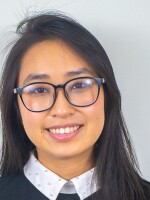This year marks the 50th anniversary of the end of the Vietnam War. On April 30, 1975, North Vietnamese Army tanks took Saigon, ending the U.S. offensive – and leading to a refugee crisis that led hundreds of thousands of Vietnamese families to flee the country.
In Washington, D.C., a collective of artists are honoring that anniversary and looking forward to the next 50 years of what it means to be Vietnamese Americans.

"50 Years of Hope and HA-HAs" is the first Vietnamese American art exhibit to open in the D.C., Maryland and Virginia region, according to the D.C. Commission on the Arts and Humanities. Anthony Le and Phillipa Pham Hughes, the duo behind the Vietnamese art collective Vagabond, curated the exhibition. It features works from 25 individuals — 18 artists and four zine collectives. The mediums include visual art, poetry, video art, zines and music from a 1.5- and 2nd-generation Vietnamese perspective; that is people born in Vietnam but who grew up mostly in the U.S. or those born in the U.S. The works offer counter-narratives of what it means to be Vietnamese American and uplift the diversity of the diaspora through themes of resilience, joy, solidarity and community.
The exhibition's name was inspired by "The Last Dinosaur," a poem by Vietnamese poet Ocean Vuong. The last line — "I was made to die, but I'm here to stay." — captures the exhibit's theme of the Vietnamese diaspora continuing on and aiming to live better decades after the deadly conflict that forced many of them out.

Le's parents were among the refugees who came to the U.S. in 1975. He says Vietnamese immigrants in America are often seen in a "one-note way," and their stories are often tied to the war. "But like everyone else, we have to live on, and we do live on," he said. "This show is a way to provide counternarratives to war and show how life continues."
The exhibit doesn't just look back on 50 years. It also looks forward to everything that could happen in the next 50 years of Vietnamese history in America, Pham Hughes says. She finds the "hope" in "Hope and HA-HA's" exciting.

"We get to be whoever we want to be. We don't have to be tied to these particular narratives." Le says that when he spoke with featured artists, he wanted them to consider 50 years of life since the end of the war, but also 50 years into the future.
Le has two featured pieces in the exhibition. His video piece, titled "Golden is My Family Jubilee," is made with home footage shot by his father from 1991 to around 2007. Moments of joy and leisure are contrasted with scenes and sounds that evoke Americana. "In my way, that's kind of how it feels to be Vietnamese and American," Le said.

His second piece, "New Year at the Garden of Eden Center," is a painting of a sculpture at the center of a Vietnamese shopping center in Falls Church, Va. "I wanted to touch on the life cycles. There's a child, someone middle-aged, and an elder in the painting. It's a metaphor for community. It's about everyone in that community. If they approach each other with love, that's how community can be sustainable."
Pham Hughes' mother wrote a poem in Vietnamese as part of her piece in the exhibit. Pham Hughes, who doesn't speak Vietnamese, wrote an English interpretation of the poem based on what her mother told her about its meaning. The two poems are joined by a story about flowers and their relationship with Vietnamese culture and Pham Hughes' mother's childhood. "It's a lot about thinking about the past and how it informs our future," she said.

The exhibit is presented by Vagabond, the art collective that Le and Pham Hughes founded. The collective's core value is that there's no one way to be Vietnamese. "I think that framing and that approach of acceptance and love is such a strong foundation for community," Le said. "Right now, we're in a cultural moment where community feels so important. When people come to a Vagabond event, that's the way we want to welcome them: with open arms. That way, you can be curious about how different we are."
Neither Le nor Pham Hughes grew up in communities with a strong Vietnamese presence. Both are self-taught artists who say that art helped them connect with and gain pride in their heritage. "I think that's why we really connected with each other," Pham Hughes said. "I wasn't around Asian people and never learned how to be Asian. I kind of had a broken family. So even within my own family, I didn't learn how to be Asian, much less Vietnamese."

"50 Years of Hope and HA-HAs" is open through March 1 at the D.C. Commission on the Arts and Humanities Gallery. A virtual version of the gallery is available to view here. The last piece of the exhibition, a musical performance, will take place at the exhibit's closing reception on March 1.
This story was edited by Obed Manuel.
Copyright 2025 NPR




